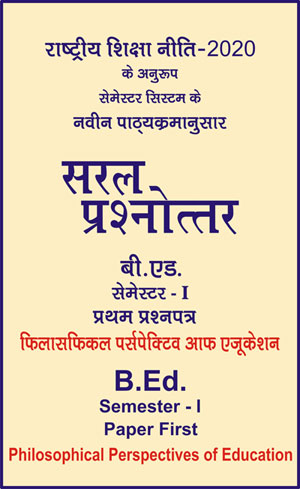|
बी एड - एम एड >> बी.एड. सेमेस्टर-1 प्रश्नपत्र-I - फिलासफिकल पर्सपेक्टिव आफ एजुकेशन बी.एड. सेमेस्टर-1 प्रश्नपत्र-I - फिलासफिकल पर्सपेक्टिव आफ एजुकेशनसरल प्रश्नोत्तर समूह
|
5 पाठक हैं |
|||||||
बी.एड. सेमेस्टर-1 प्रश्नपत्र-I - फिलासफिकल पर्सपेक्टिव आफ एजुकेशन (अंग्रेजी भाषा में)
Question- Discuss the philosophical concept of education.
Answer -
Philosophical Concept of Education
Human beings are the centre of thought of philosophers. They try to know the real nature of man and determine the ultimate purpose of his life. Philosophers are also interested in determining the means and path of achieving the ultimate goal of human life, and for all this knowledge and training, they consider education necessary. Thus, from the point of view of philosophers, education is a means of achieving the ultimate aim of human life and that philosophers have different views regarding the ultimate aim of human life, so there is difference in the definitions of education fixed by them. From the point of view of universal Guru Shankaracharya -
“Education is that which leads to liberation.”
Indian sage Swami Vivekananda considered man complete from birth and emphasized on making him capable of realizing this perfection through education. In his words - “Education is to express the inherent perfection of man.”
Guru Purusha Mahatma Gandhi has laid great emphasis on the development of body, mind and soul. In his words -"By education I mean the foster and all-round and best development of man's body, mind and soul."
The Greek Philosopher Plato also acknowledged the importance of both the body and the soul. As per his thoughts -
"The task of education is to give the body and soul of man the perfection that they deserve."
Plato’s disciple Aristotle emphasized on the physical and mental development of man. He believed that only after proper physical and mental development can man realize the soul. He has defined education in the following way:
"The creation of a sound mind in a sound body is education."
The materialistic philosophers consider only the temporal life in man to be true. According to them the ultimate aim of human life is to live happily and to live happily it is necessary that one should be healthy of body and mind and endowed with the means of sense enjoyment. They want to do all this through work education. From the point of view of the materialistic Charvaka:
"Education is that which enables man to lead a happy life."
The naturalist philosophers of the western world are also in favour of achieving material pleasures. From their point of view, this is possible only when man establishes coordination between his internal and external environment. According to Herbert Spencer:
"The meaning of education is to coordinate the internal forces with the external life."
Among the western philosophers there are now many such philosophers who see the life of man as it is. The pragmatists consider man to be a social animal and believe that through education man should develop many abilities to adapt in the present society and to build the society of the future. In the words of the pragmatist philosopher John Dewey:
"Education is the development of all those abilities of a person which give him the ability to control his environment and fulfill his possibilities."
|
|||||














